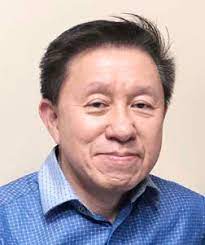UNDER THE MICROSCOPE

“Medice, curate ipsum” comes from the Bible, Luke 4:23: “Ye will surely say unto me this proverb, ‘Physician heal thyself’; whatsoever we have done in Capernaum, do also in thy country.”
This column will not be very popular among my fellow doctors. But please read on and be glad you did.
Recent news about a pharmaceutical scandal of sorts involving doctors serves as a reminder to us doctors to engage in some introspection. The issue here is more ethical than legal, I think, and one does not necessarily equate to the other.
Personally, I view my being a doctor as a role model for health. Other people tend to look up to physicians as somewhat higher-stationed due to education and vocation.
Years ago, I visited a cardiologist and while in the waiting room heard him lecturing a patient on how to stay healthy. When the patient left, I was shocked to see him chain-smoking away and the room enshrouded in a haze. My first thought was, how he can even think of telling his patients to be healthy when he himself behaves carelessly with his health. A few years later, he came down with lung cancer and died a miserable death.
Nowadays, many doctors still behave that way, sort of saying to their patients, “Do as I say, not as I do.” In meetings, conventions and in hospital hallways, I meet fellow physicians who are grossly overweight, with bulging tummies and who smoke or drink too much. A significant proportion of doctors over 40 suffer from hypertension, diabetes, metabolic syndrome, heart attacks, strokes and end up disabled or dying young.
We’re not talking about genetic predispositions that cause early deaths from cancers, but even some cancers like lung, are what we call a two-strike proposition. Genetic mutations may serve as the first strike, but smoking triggers malignant transformation.
Other cancers are driven by sexually transmitted viruses like Human Papilloma Virus (HPV) which can cause cervical, vaginal and vulvar cancer in women, penile cancer in men and oropharyngeal and anal cancers in both men and women. Thus, it is a lifestyle disease as well. HPV vaccines are now available but rarely do I hear colleagues discussing having themselves and their families vaccinated.
Doctors often reason that they don’t have time for exercise, too busy with work or that they are stress-eating. Basically, it’s a matter of self-discipline. We can certainly spare an hour or two a week to exercise, at home or in the gym. It doesn’t have to be a formal affair. Just going up the stairs instead of taking the elevator contributes to your cardiac and metabolic health by burning calories. The wining and dining of doctors by pharmaceutical companies also takes its toll on their weights and figures. A little bit of self-discipline in this matter is definitely a must.
Some of us do follow a healthy lifestyle. During a recent blood drive, I was donating blood alongside a radiologist in his 60s who said he regularly runs 21-kilometer marathons and appeared fit as a fiddle. He donates blood regularly because he can pass the stringent requirements for a blood donor. As a non-clinician, he doesn’t regularly see patients so he’s doing it for himself. It certainly helps in prolonging your professional life even at an advanced age, which is one advantage of staying fit.
Patients are likewise inspired by doctors who seem to be the epitome of good health, because they view doctors as people who don’t get sick. They think doctors know what it takes to be healthy. We let them down when they hear of doctors falling ill or dying of lifestyle diseases at a young age.
How can we instruct our patients to lose weight, exercise more, eat healthy, drink less alcohol or not smoke when they see us doing exactly the opposite? No wonder many patients don’t follow their doctors’ instructions. Subconsciously, they must be thinking, “If you can’t follow your own instructions, why should I.” There goes patient compliance out the window.
So, physician, heal thyself. Our medical associations and specialty societies should do more to encourage medical practitioners to subscribe to a healthy lifestyle and not be slaves to their inner demons. Being healthy is its own reward-less catastrophic illnesses, less medication expenses and better quality of life. What’s the purpose of accumulating wealth when you have to spend it on your hospitalizations and drugs? Being healthy, we can continue practicing into old age. That can certainly help remedy the doctor-to-patient ratio imbalance (currently 1:26,000 and ideally 1:20,000).
But ultimately, it is your own initiative to resolve to be fit and healthy. You owe it to your patients, but you owe it more to yourself and your family. Health is wealth. Let’s stay healthy!